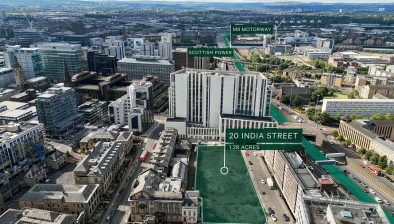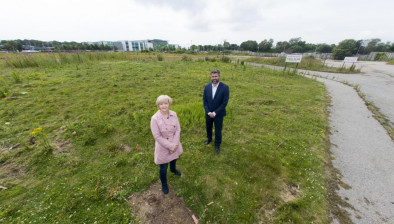CBRE foresees optimistic rebound in Scottish housing market

Chris Dougray
Global real estate advisor CBRE has predicted a modest 0.8% decrease in house prices in Scotland for 2024, slightly below the UK average of 0.9%.
However, a positive outlook emerges as CBRE foresees a rebound in 2025 with a 4.2% rise to £187,589, and a further 5% increase in 2026, reaching £196,968.
Looking at the bigger picture, prices are expected to rise by 16.4% in Scotland between 2024 and 2028 (UK 15.5%) offering hope for homeowners currently facing falling house values and high mortgage rates.
Chris Dougray, executive director for development at CBRE Scotland, said: “The Scottish property market continues to be resilient despite the current financial climate. Mortgage stress testing, an improved economic backdrop and base rate peaking at a lower level than anticipated means that the market has been shielded from larger falls than originally forecast this year.
“Affordability is less of a factor in Scotland than in other parts of the UK but there is still a shortfall in the number of new homes being built here.”
CBRE has upgraded its 2024 UK house price forecast, from a fall of 2.2% to a marginal 0.9% decline. This will follow a 2.1% annual fall CBRE anticipates for full-year 2023.
CBRE forecasts the base rate to fall to around 4.8% by Q4 2024 as inflation gets closer to the Bank of England’s 2% target. Inflation should slow to 2.6% by the end of 2024. Annual GDP growth is expected to be 0.3% in Q4 2023, before strengthening to average 0.6% in 2024 and 1.8% in 2025.
Home sales volumes are not expected to rebound significantly, but an improved macro-economic backdrop and falling interest rates will underpin housing demand in 2024. CBRE expects sales volumes will remain below the long-term average in 2024 at circa one million homes and improve to 1.2 million in 2025. This would mark a return to the average sales level following the Global Financial Crisis. Notably, sales volumes should recover more quickly in London’s new build market, with strong gains of 27% in 2024 and 21% in 2025.
CBRE forecasts rental growth to remain strong but decelerate from the 6.2% forecast level in 2023, to 5.1% in 2024, because of falling inflation and stretched affordability. Between 2024 and 2028, rents are forecast to grow by 19.2% across the UK and 20.7% in London. CBRE predicts rents in Scotland will see a compound rise of 13.8% by 2028.
Mr Dougray added: “Renters are facing a lack of supply, made worse by private landlords leaving the market because of interest rate hikes and previous tax changes. The same interest rate rises have also pushed homeownership further out of reach for many, compounding the already high-level of demand for rental homes.”
Scott Cabot, head of residential research at CBRE UK, commented: “Buyers’ budgets will recover to an extent in 2024, albeit this won’t support house prices at their current level, and we expect the first half of the year will be met with continued affordability challenges. But as interest rates begin to fall, mortgage affordability should improve and as a result, house price growth could rebound in H2 2024, partially offsetting H1’s weakness.
“The recovery of sales volumes will be reliant on further improvements to buyers’ budgets. This will only be facilitated through mortgage rates continuing to come down, combined with a further price correction.”
There are 850,000 two-year and five-year fixed mortgages renewing in 2024, which will be impacted by higher interest rates at the point of refinance. However, CBRE believes mortgage rates are past their peak. In November, the two-year fixed rate on an 85% LTV mortgage averaged 5.65%, down from the peak of 6.35% in July.
Mr Cabot added: “While rates are still higher than at any time since the Global Financial Crisis, the downward trajectory is expected to continue, as the main determinants of mortgage pricing – the base rate and swap rates – fall. This will improve buyers’ budgets as we move into 2024.
“The mortgage market is also becoming increasingly more competitive, which will benefit homebuyers and those remortgaging next year.”









